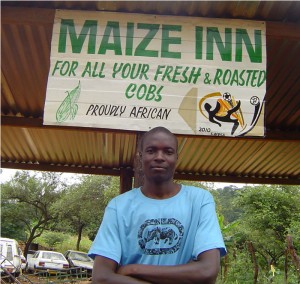The hazards of giving birth in Zimbabwe
Wednesday, March 17th, 2010 by Delta NdouA week ago a woman gave birth at a tollgate. According to the story the woman was on her way to Gweru Hospital where she had been referred to by the Shangani District Hospital presumably because the district hospital was not capacitated to do the delivery.
But that’s just my deduction.
What was reported is that the woman was already in labor when she caught a ride from a haulage truck driver who was heading in the same direction and when the truck was stopped at the tollgate; she was on the verge of delivering; the truck driver saw it fit to leave her somewhere near the tollgate so that he could rush along and go on his way.
Can’t blame the poor fellow though – he was probably terrified that he would end up being saddled with a new born baby and all the mess that accompanies childbirth moreover, he certainly wouldn’t want his employer to find out that he had turned the company vehicle into a delivery room.
In any event the woman was unceremoniously dumped on the roadside, where she ‘rolled’ around on the ground, writhing in agony before her anguished cries attracted the attention of the police and Revenue authorities who were manning the toll gate.
With the assistance of these officials, she delivered a healthy baby and remained attached to the infant as none of them wanted to hazard cutting the umbilical cord; they couldn’t decide how many centimeters to cut off from.
In any event, an ambulance from Gweru conveniently arrived with paramedics who proceeded to cut the cord and ferry the woman to hospital where we are told the woman is recovering very well.
The story was written in the light-hearted manner of one telling an entertaining story; the tone conveying a hint of humor because – well it’s one of those stories one can tell knowing they will have an engaged and enthralled audience.
What makes it all the more appealing is that it’s all true and with a nice little ‘happy’ ending to wrap it all up – the baby is safe, the mother is recovering, the officials who were there now have a story they can one day share with their grandchildren and of course, it was suggested that the infant be named “tollgate”.
So all’s well that ends well, right?
Wrong!
It seems to me that this report totally missed the point.
The point is, why on God’s green earth was the woman referred to Gweru in the first place? Why are district hospitals incapacitated and why; with less than five years to meet the Millennium Development Goals (MDGs) are we still having women’s maternal healthcare being so grossly ignored?
The point is why, in a three decade old independent Zimbabwe, are women giving birth in the open like animals?
And oh, the indignity of it!
Anyone who is well-versed on the subject of the arduous rigors involved in birthing will know that the exercise is excruciating and it is, for every woman a time of extreme vulnerability. There is indeed, nothing trivial about it because of the high risk involved, too many women die giving birth and others die due to pregnancy related complications yet coverage given to these tragic occurrences borders mostly on nonchalance without any appreciation of the gravity of these incidents.
To my way of thinking, the story raises several issues that warrant interrogation and are basically screaming for scrutiny.
One of them is the glaring lack of sensitivity with which the subject is treated – so matter-of-factly and it somehow succeeds in making the woman’s plight almost inconsequential.
Needless to say, gender sensitivity is a notion whose import has largely gone unheeded or has not been prioritized in many sectors of our society – this is just one manifestation of this culture of indifference.
What is even more upsetting is that these attitudes permeate to all other coverage of matters that directly affect women and impact on their health and interests.
There is something wrong with a health delivery system that fails women at a time as crucial as child birth – but there is something inhumane about a society that would condone this by finding the slightest element of humor in what is clearly outrageous.
And of all the things that could be said about a woman delivering in such unusual and inappropriate circumstances; the very least one can do is remember to point out the fact that we expect more of our Government – what with the combined weight of three political parties?










